I took this photo on Wednesday in Lower Austria. These beautiful berries (I believe they are called “coral” berries) were growing wild next to a small regional hospital. I was at the hospital to visit a patient from Ukraine. That experience had quite an impact on me in that I saw firsthand what public medicine can and cannot do. It can stabilise. It does not give all the tools to make real lifestyle changes. It does not hold your hand how they show rehab on TV in America. I left thinking how important it is to communicate to everyone I meet, and to myself frankly, that true, lasting changes in life have to come from within.
There is a certain learned helplessness, for sure trauma-induced, which some refugees carry with them for months, expecting volunteers to sort out all situations, big and small, for them. But the reality is no one in life is going to sort out all of your problems, and it gets easier the sooner each person learns to help themselves to the best of their abilities. For sure some are simply more capable in the face of adversity than others. Some struggled in Ukraine even before war landed on their doorstep. But it all made me think about the old line about teach a man to fish rather than gifting him fish. I want to have that in the back of my head, rather than getting upset when I am sometimes asked to do really simple things for people. To politely decline to do the work for them while pointing them towards tools to help them do it themselves.
I don’t want to sugar coat things. Some Ukrainians are still really lost, travelling around unsettled. I met a mom of a toddler from Kharkiv a few weeks ago, gave her a Hofer card, told her where to go to the dentist over a weekend. She called me yesterday in a panic. She left Austria (for the second time), was now in Poland, and was freaking out that Poland asked her for a piece of paper confirming she was no longer registered in Austria, and she had failed to tell anyone here that she left. There are rules in every country and of course you have to follow them. So I explain I am driving my car but as soon as I am not driving, I will send you the email addresses you need to write to in order to let the Austrian interior ministry know you left, for good. I then get to the arrival center where I meet a family who knew this woman. They told me she wanted to go back to Kharkiv. But she took off without telling anyone, and while her child had a high fever. Ugh, I sighed, why?! She and her daughter had at one point housing in Austria. They were registered here. But the fantasy that something was better somewhere else let to a chain of events that I am not sure will result in a stable existence for mom nor daughter. But that’s the thing. Refugees are human just like the rest of us, and they bring their problems with them. There are limitations.
Yesterday, standing in front of the arrival center in the late winter sunshine, I met a couple from a coal mining town in southern Luhansk oblast (occupied by Russia since 2014), whose stories left me standing there with my jaw open, just shaking my head in disbelief and horror.

I’ll start with the good part. Mom, dad, and 17 year-old daughter were just now assigned a dorm room in Vienna in a former nursing home where residents can cook for themselves. In the grand scheme of organized housing provided by the state, this is about as good as it gets. You are not “fed”, you can buy and prepare your own food, you are in Vienna with access to everything on offer here from charities and NGOs and German courses, and simply all the opportunities a major metropolis offers. The older sister was studying in university in Kharkiv when the war began, and came to Austria nearly a year ago. She is in a town in Lower Austria and still continuing her degree online. The family have been reunited. They hadn’t seen each other in a year.
Roughly three weeks ago, mom and dad made the decision it was time to leave. They had waited and waited and waited and finally decided staying there, in occupied Luhansk, was a ticking time bomb. The first thing dad says to me (tall, fit, roughly 50, a friendly smile marked by a few gold teeth) is “for the past year, I have only been outside walking from vegetable garden to vegetable garden. From our house to our parents. Never on the main roads. Never to the market.” Across occupied Donetsk and Luhansk, ordinary men have been targets of Russian army recruiters since day one. Recruiters isn’t the right word. They are pulling men of all ages off the streets with draft notices from all public places.
“First they took our guys, then in summer they sent in the prisoners (Wagner), then fall another round of mobilization, then it got really bad again after New Year’s…now they moved in new equipment”. Dad worked his whole life as a coal miner, and one decision quite literally probably saved his life: he asked for early retirement from the mine a few months before February 24, 2022. This meant when the Russian army showed up and demanded all local employers produce lists of all their able-bodied male employees, he wasn’t on a list anymore.
“I have been going to funerals every week. Every week I lost another friend. One really good guy, we worked together. 35 years old. Gone. For what?”. I stand there, my mouth open, my head shaking, just in horror. Imaging all those funerals. Thinking about the women and children and ageing parents left behind. A whole generation of hard working ordinary men, Russian-speaking men to be frank, wiped out. For what?
He continues. “They gathered them up in groups of ten. And they would give an order like go take that next building over there. And then they would throw the guys out there, running across a field with body parts strewn across it. Legs, arms, heads. And then they send in the next group of ten…”
I thought I was going to vomit right there just listening. And he was recounting it all in such a matter of fact way. This was the new reality they lived in for months. His wife listened quietly. She had heard it all before. She knew it all.
The family decided to leave. On their own. With no help from agents or the like. They gave away their animals and pets to the older generation. The older generation stayed behind. I nodded in understanding but did not dare ask how that goodbye felt. They traveled to Russia, using buses and then later trains. It took hours to cross into Russia. Full interrogation. Full questioning. They searched Dad’s phone for hours. The Russians are still searching for any evidence of sympathy to the Ukrainian cause. When they gave it back, it lagged. Dad is sure his Telegram has been hacked with some kind of info tracker in some way. He says he will have to get a new phone when he can afford it.
Their 17 year-old daughter did not have a Ukrainian international passport. With covid and then war, they never had a chance to go to non-occupied Ukraine to process the application. She left on her birth certificate. Once allowed into Russia, the family took buses and trains all the way up to St. Petersburg and then crossed into Estonia and back down to Austria. The entire journey took five days. They then spent two weeks living on cots in the arrival center, and a few days ago were finally given a housing assignment in a Vienna dorm. They got lucky. Another family left, freeing up the room.
When the saw their room, mom and dad recalled, their teenage daughter burst into tears. I tried to reassure the parents that under the circumstances, this room in central Vienna is really a lucky offer. Others, hundreds, live where they are fed three times a day and only given €40 per month pocket money. Or stuck in rural villages with no access to affordable transportation:

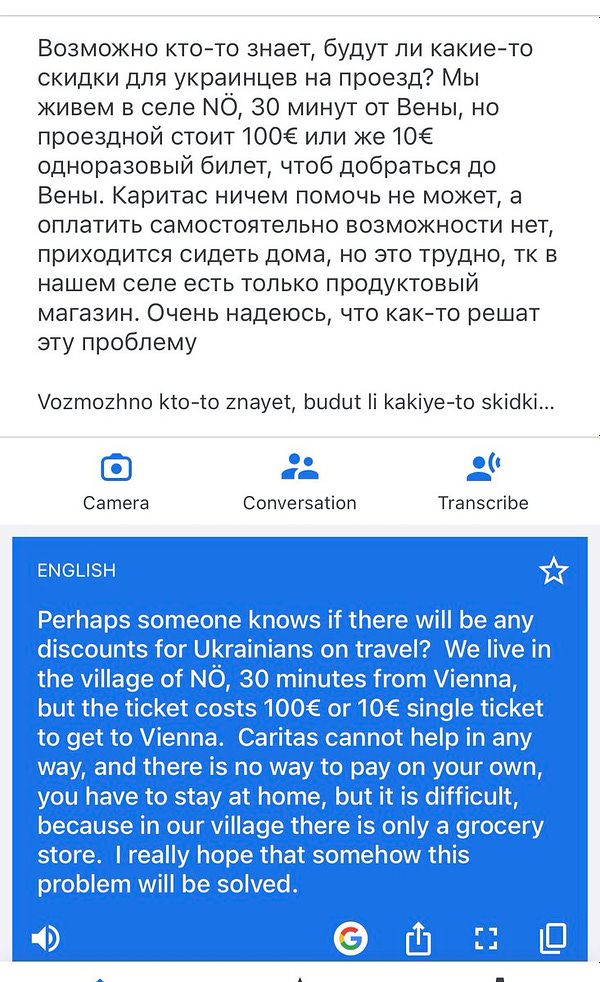
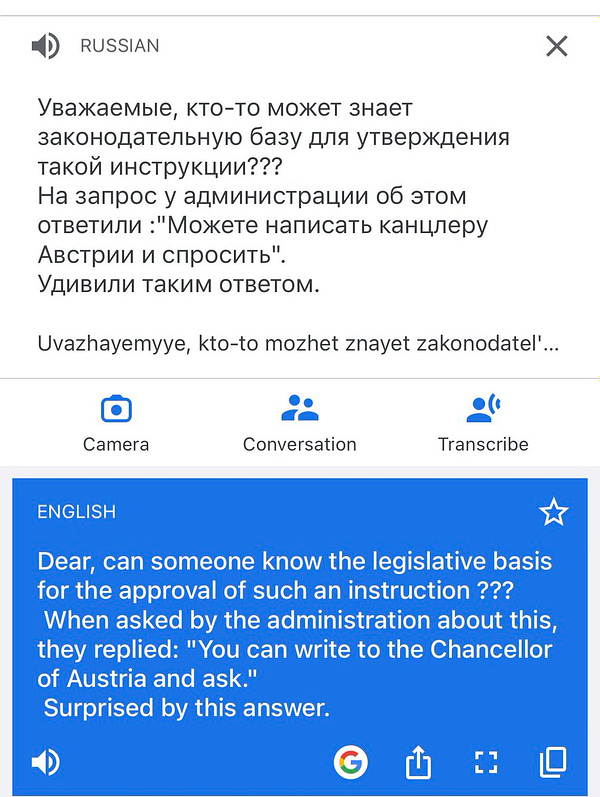
Mom and dad understand this. The are grateful to be here, to be all together, to have saved his life, to be close to their older daughter. They know there is no road home.
I always pay special attention when I receive messages from Ukrainians from Donetsk and Luhansk because I know for them the war has been raging for nine years already. Like this message in my inbox last night:
And then she sent me the photo of the building, and I remember immediately that from the news.
To have to give up everything with no notice once is terrible. To have to do it twice in the course of a decade is unimaginable. I am sending her a grocery card today. As soon as I hit “publish” on this. Thankfully I have a few more cards to distribute. A kind reader discovered you can now buy Hofer cards online and send them by email. I still have to print them out an mail/hand them over, because the Hofer fine print wants a paper print-out rather than a scan of a barcode from am mobile phone, but it is still progress. If any of you would like to donate this way, please just get in touch for my email address. I’ve stocked up on colored ink and my printer will do the rest! Thank you.
In other news, more evidence that Austrian policy makers clearly are either incompetent or do not want Ukrainians to work, or both:

I have seen the bill. It is real, issued by FSW. I also know from my manicurist, legally employed since November, that she too was issued a bill to “pay back” around €800 of social payments she received before she found a job in Austria. Which makes no sense at all. They do not ask residents of Austria to re-pay their unemployment benefits once they find jobs. This will spread like wildfire and create yet another disincentive to finding legal, full-time employment. I heard this week the following: “so and so got a job, she is a cleaner, she earns €1000 per month, and she lost all her social payment, and now she works her butt off just to pay rent, what is the point?”.
People all over the world regardless of their nationalities respond to basic economic incentives. The economic incentives right now in Austria punish those who go to work and send a message to sit quietly on benefits while maybe earning a little undeclared cash on the side. Which is so stupid and such a shame in the context of so many Ukrainians who could make a very positive contribution to this small country’s economy. The Ukrainians are anything but stupid, and realize what is happening:

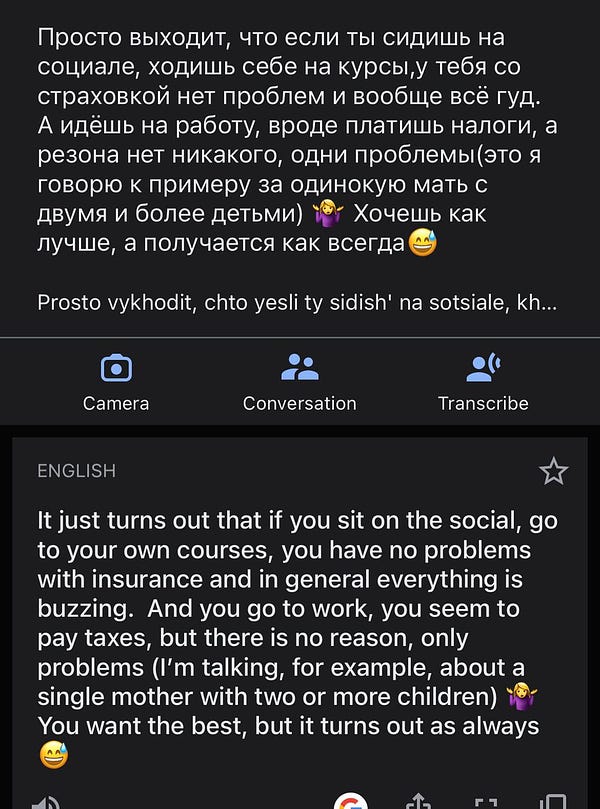

Inflation continues to rage and bite everyone, locals and refugees alike. I read two different economic reports yesterday basically saying that inflation is being driven not just by rising energy costs, but mostly by greedy companies increasing their profit margins because they can get away with it now under the pretext of “inflation”. This isn’t just an Austrian problem. This is an EU-wide phenomenon. I don’t have a good feeling for what the economic situation is in North America now, but in Europe each and every one of us is feeling real pain at the moment. Well, everyone except for this lady:


The grocery photos continue to arrive. Some very modest. Some very uplifting, like this one. €50 buys a heck of a lot less now than it did nearly a year ago, but it is still really helpful particularly as a bridge for those who just arrived and are not yet receiving any of the payments in Austria. Those families remain my top priority, and the word-of-mouth-grapevine within the arrival center is still working, thankfully. I will deliver two more cards later this afternoon to two moms who arrived recently with two 13 year-olds.
Thank you for reading and for your continued support!



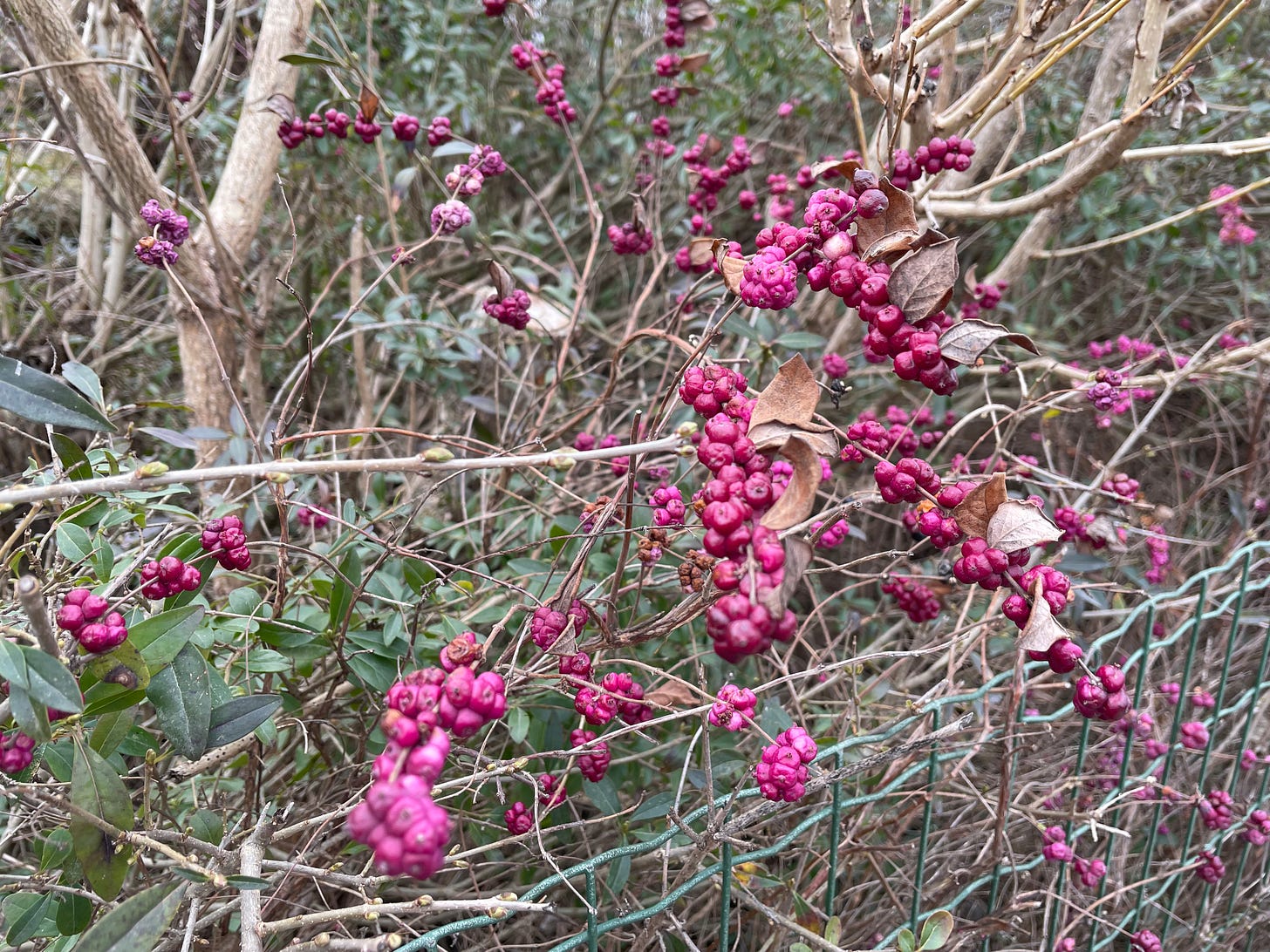
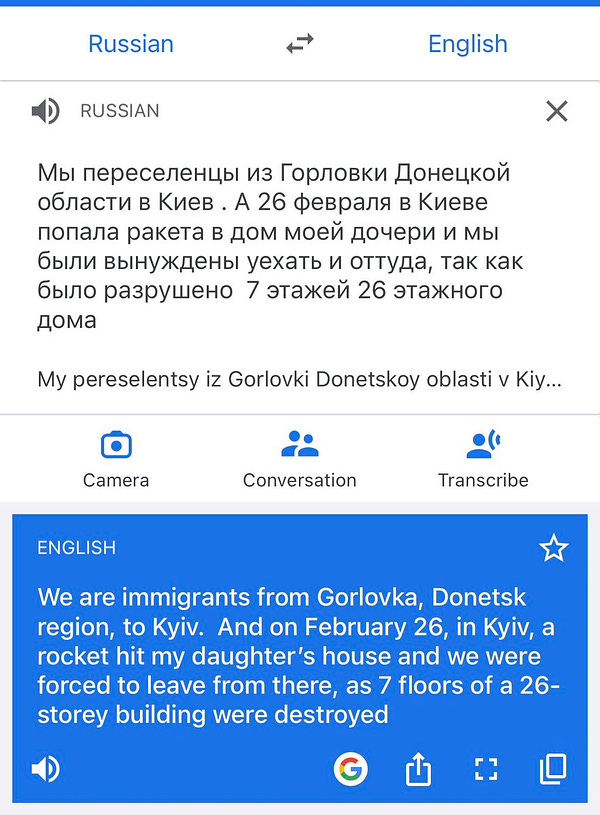
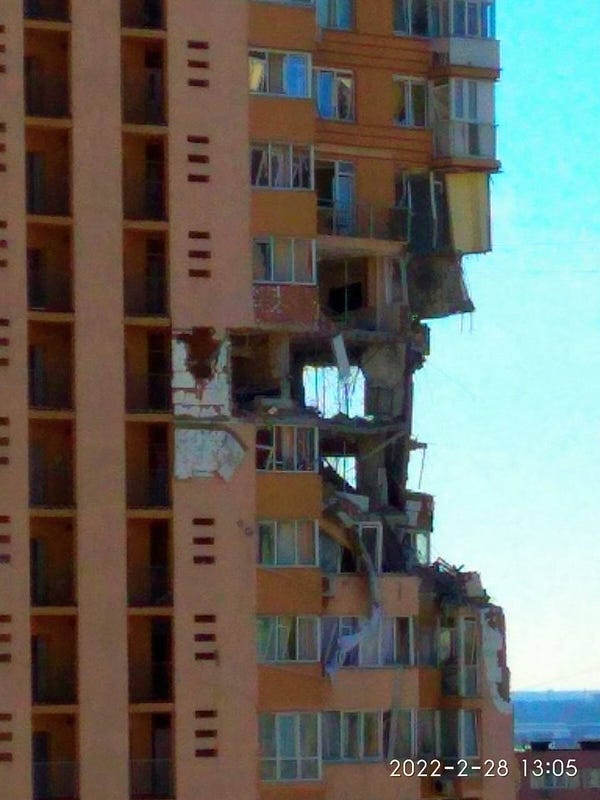
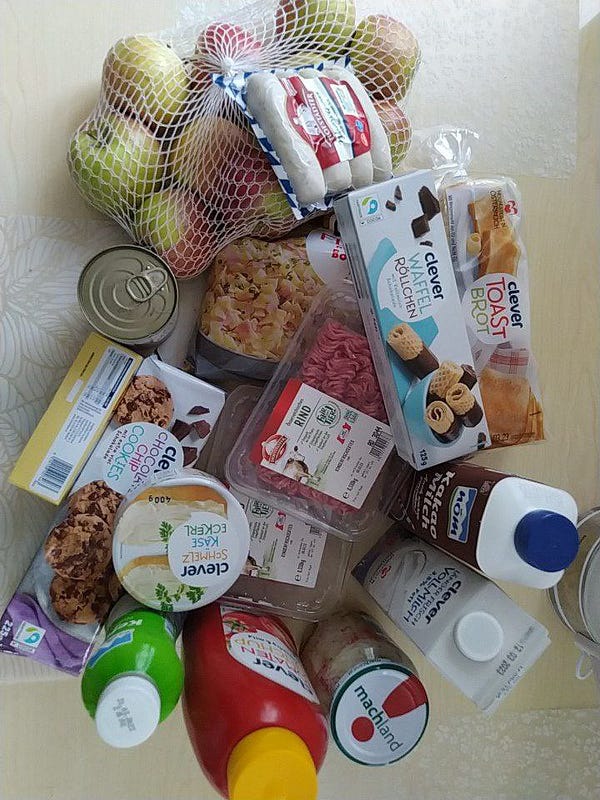
Hey Tanja - since I left Twitter, your substack has become much more important for me to keep up to date with the plight of Ukrainians in Austria. You give a much-needed voice for a group that is way too often ignored.
Thank you!